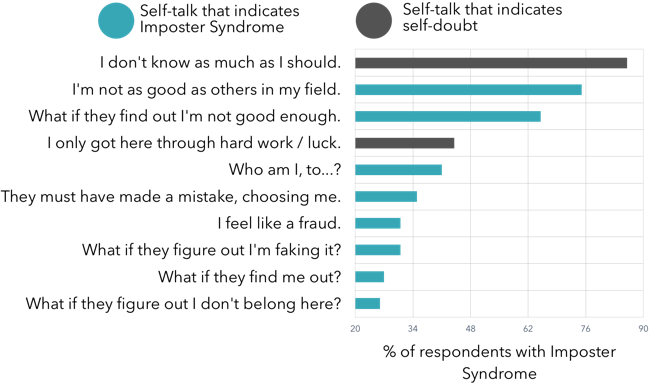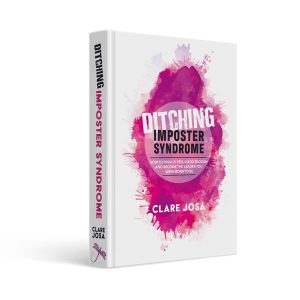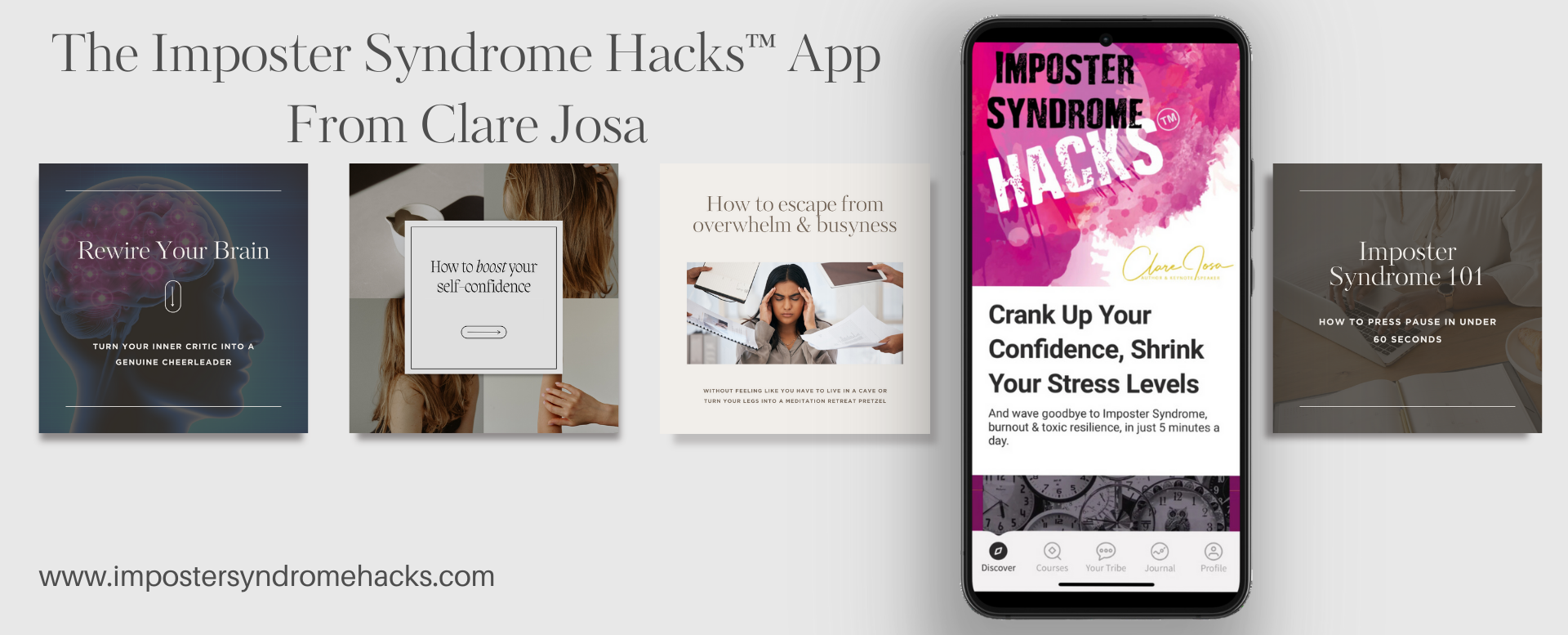“But surely imposter Syndrome is just a trendy form of self-doubt?” I hear this in comments on social media posts, regularly, especially from people who have never struggled with Imposter Syndrome.
The thing is that self-doubt or having an over-active inner critic doesn’t necessarily mean you are running Imposter Syndrome – they are two different beasts.
Whilst self-doubt can be a symptom of Imposter Syndrome, you can have an unhealthy dose of self-doubt without fearing you’ll be found out as a fraud. And a normally confident person can become paralysed by the fear of being found out as a fake – that they don’t belong in the role they’re in – if Imposter Syndrome strikes.
Self-doubt usually parties with your thoughts and beliefs about what you can do, with your inner dialogue telling you (thoughts) that you’re not good enough at something (belief about a capability). That’s why cognitive approaches such as CBT (Cognitive Behavioural Therapy) and NLP (Neurolinguistic Programming) can have a positive effect to reduce self-doubt and increase confidence. Working with your mindset can help.
But Imposter Syndrome doesn’t hang out there. It’s lurking in the depths of the ‘who am I?’ self-talk discussions, not the ‘what can I do?’ self-talk. At that deeper level, it’s about your sense of who you see you are. Cognitive and mindset strategies don’t touch the sides, because they’re busy with your thinking mind, which is the surface level symptom of what’s really driving the show.
Imposter Syndrome is more than self-doubt in a spiky suit. It’s not about your beliefs about what you can or can’t do. It’s driven by who you think you are.Click To Tweet
That’s why Imposter Syndrome wakes you up at 3 a.m. like no ‘simple’ worry ever could.
All of this is good news for people with self-doubt, because handling the surface level thoughts and beliefs that trigger us doubting ourselves can produce fast and effective results with your confidence.
It’s important to know whether you’re running Imposter Syndrome or ‘just’ self-doubt, because the methods for clearing them are so different.
That’s why so many people believe that Imposter Syndrome is incurable – because the classic coaching mindset and self-awareness techniques we use to help with self-doubt and confidence don’t work for it.
There’s no brain scan that’s going to tell you whether or not you have Imposter Syndrome, so the most useful indicators you have are your self-talk and your actions. Here’s an overview of how respondents in the 2019 Imposter Syndrome Research Study described their self-talk when Imposter Syndrome strikes, so you can see how you compare:

Some of the language people use to talk about Imposter Syndrome actually reflects self-doubt. “I don’t know as much as I should” is actually about your skills and capabilities, not your sense of identity. You can fix this through either getting the training you need or using cognitive strategies to help yourself to see the external evidence of your abilities more objectively.
Similarly, “I only got here through hard work” is about your actions and behaviours, not who you see yourself as being. Using cognitive or mindset techniques can help you to acknowledge your achievements and the roles you played in them.
But when we move onto the blue statements, the language we use is different. It is all about who we think we are. They are identity-level statements. And these are strong indicators of Imposter Syndrome. If you’re running these in your self-talk then you need to use different strategies to clear them.
When we think about how Imposter Syndrome can affect our working lives – and even our home lives – then ignoring it and hoping it will go away (the most common response, according to the research) seems a bit crazy. But in reality, people are doing this because they don’t know what else to do; they have tried the mindset-level stuff and it didn’t work. And now you know why!
 I cover both clearing self-doubt and setting yourself free from Imposter Syndrome in my book Ditching Imposter Syndrome. If you’re hungry to discover for yourself how ditching ‘feeling like a fraud’ and finally feeling ‘good enough’ is easily within your reach, then you can get your copy here:
I cover both clearing self-doubt and setting yourself free from Imposter Syndrome in my book Ditching Imposter Syndrome. If you’re hungry to discover for yourself how ditching ‘feeling like a fraud’ and finally feeling ‘good enough’ is easily within your reach, then you can get your copy here:
ditchingimpostersyndrome.com/book/
And if ditching Imposter Syndrome is something you’d like to work with me on, you can find out more here.

